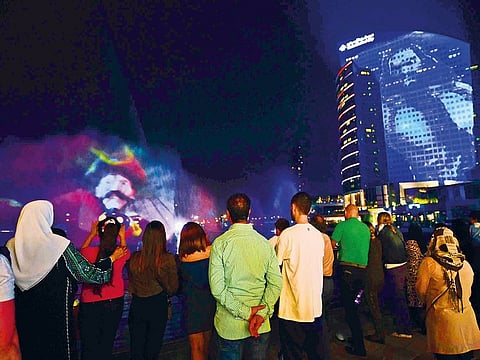UAE developers are taking malls just beyond shopping
They race to rework formula, take on online shopping by adding more experiences

Dubai: Open a certain number of retail stores, create more F&B options, and provide ample space for cinemas and family entertainment arcades — that used to make for a successful mall.
But that’s not how Timothy Earnest sees it. “There’s a fourth pillar that malls will need to have … and that’s about setting up moments or experiences that are special,” said the CEO of Al-Futtaim Malls, the developer of Dubai Festival City and of the upcoming Festival Plaza in Jebel Ali.
“You want to have more people coming in and Instagramming themselves with something that’s just happened at a mall. It needn’t be a static one-time event, but something that happens though the year. As the mall owner, our part is to help deliver those moments that people want to share or be a part of.”
What shoppers here keep telling us every Friday and Saturday is that they love going to the malls.

Mall retailing in the age of e-retailing has essentially become a story of how well they do on weekends. Get crowds flocking in from Thursday evening to Saturday closing time and mall owners have reasons to cheer. If they manage to repeat this over multiple weekends, that makes for a good year.
This is where the social aspect comes in. Earnest reckons that mega-malls in Dubai have an inbuilt advantage over their counterparts in the US or Europe in getting this right.
“What shoppers here keep telling us every Friday and Saturday is that they love going to the malls,” said Earnest. “But you don’t see this four-pillar formula elsewhere — 70 per cent of the mall space in the US are with anchor stores. So, if one big store closes, it could cause problems for the entire mall. Those are outdated concepts … and it’s been said plenty of times.
“The future of malls is to be not dependent on any store or concept.”
But there is one detail that mall developers in the UAE and the Gulf could still do a whole lot better — not take too long building the next generation of malls.
“The gestation period for new malls once they open is seven to eight years,” he added. “If the developer wants to fit in all the elements to make a mall unique, it means taking a far longer time to build. When that happens, some of these elements may no longer sound cool to visitors.
“What should work better is developers thinking more in terms of “phasing” — do the opening in three years and then add new phases.
“The thinking used to be that when you build a mall, developers felt they really didn’t need to do that much for the next five seven years. But now, you better do something new the next year itself and the year after that.”
We expect new assets coming to market to focus on big-box anchors such as a cinema, family entertainment, supermarkets or fashion retailers focusing on fast fashion, for example.

Between now and 2021-22, Dubai will open the doors to a range of new mall destinations, from the one on the Palm (the Nakheel Mall) to a massive one for Deira Islands. And onshore, there are the Meydan One Mall, while Emaar is closing in on the opening date for the one in Dubai Hills.
Al-Futtaim Malls is busy with the Festival Plaza development, which will add 650,000 square feet of gross leasable area in Jebel Ali, fast emerging as a residential location of choice for freehold property owners. “We didn’t want to force the market with many more square feet of (leasable) space and be something other than where the opportunity is,” said Earnest. (The Festival Plaza, which will have an Ikea, is scheduled to open late this year.) Is there a perfect formula that mall developers need to work on? Say, ‘x’ percentage space for retail, ‘y’ for F&B, ‘z’ for entertainment and then spread the property with experience-generating opportunities?
“There’s no magic formula — but all four elements need to be balanced to some degree and even changed seasonally,” the CEO said. “Even a closed mall has to take advantage of the four months of nice weather we have here.
“But instead of relying on outside parties — for the stores, the F&B, and entertainment — mall owners will have to come up with their own ways to create the experiences. Where needed, we will take on partners to do something creative.
“That’s needed because things happen much quicker via partnerships than just wait for the market to produce something on its own.”
Amid these shifts, will it mean the end of anchor/big-box stores in malls? Anthony Spary, Associate Director at CBRE M. E., reckons they will be around even at the “next generation of malls”.
“However, the format of these stores will certainly evolve,” Spary said. “We expect new assets coming to market to focus on big-box anchors such as a cinema, family entertainment, supermarkets or fashion retailers focusing on fast fashion, for example.
“Fashion brands remain integral to the success of a retail asset with brands now looking to provide more of an immersive experience within their stores. The key is to strike the right balance between experience, entertainment, F&B and shopping.”
Omni-channel retail to take up space at a new mall in Abu Dhabi
■ The future of retail is getting built now — an upcoming mall in Abu Dhabi will have 23,000 square feet dedicated to eCommerce logistics. The intention, according to the developer of Reem Mall, is to build the “first fully digital smart shopping centre”. “In a world where consumers expect any experience to be literally at their fingertips, we are taking this one step further by creating an on-demand connection between customers and retailers,” said Milat Sayra Berirmen, Digital Experience Manager for Reem Mall at a retail industry event last week. The mall, which will cost $1.2 billion, is to open late 2020 in Najmat District on Reem Island. ■ Fretting about when that delivery might come in? A tech start-up is offering last-mile delivery services to online shoppers in the UAE, hoping that there would be sizeable user base wanting to pay for instant delivery. “It’s the most annoying and stressful part of the e-shoppers’ experience,” said Soumia Benturquia, founder and CEO of Fodel. “What if you can’t wait any longer? Or what if you miss the delivery guy’s call who wants to ask you more questions about your location?” Fodel currently has a network of pickup locations featuring 1,000 merchant outlets across the seven emirates, and has same-day delivery in 95 per cent of cases. During its Series A funding round, it raised $2.6 million and is in the process of raising an additional double-digit funding.



